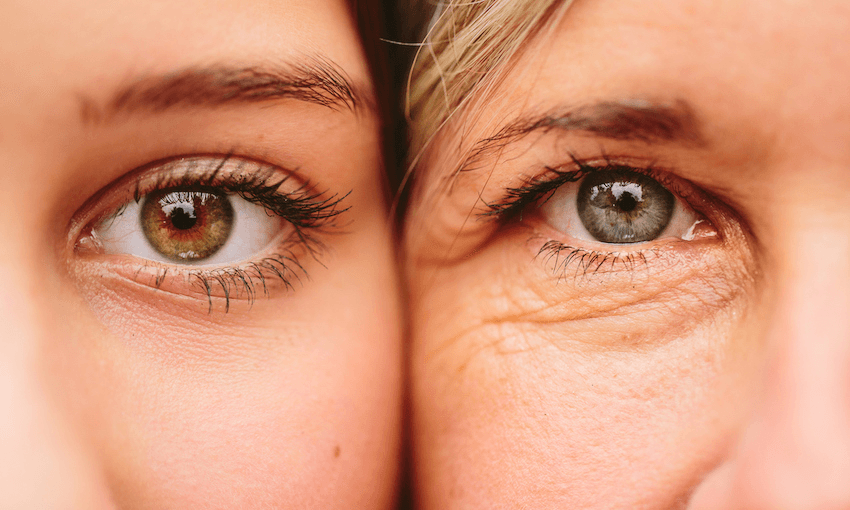If we started seeing it as a process of becoming more and more ourselves, would we find more value in ageing?
For the first 15 years of my life, I desperately wanted to be older. Then came a period of about the same length during which I enjoyed being young. In my fourth decade, I’ve advanced toward middle age (or has it advanced toward me?) with quiet satisfaction. The “visible signs of ageing” have appeared on and about my face, just as the advertisements said they would: grey hairs; wrinkles; age spots; increasingly eccentric eyebrow hairs. But I am enjoying not being quite young anymore, and I love what’s happening to my face.
Some aspects of ageing aren’t the best, it’s true. Menopause sounds a bit crap, and getting older often means more creaking and groaning and a slower recovery from injuries and illnesses. You ache in places where you used to play.
But I think a lot of the ageing process – especially visual ageing of the face – is really interesting and, with the right attitude, delightful. I find the continual change interesting and almost exciting, like an adventure. My face is on a lifelong journey that started when I was born and won’t finish until I die. The face I will have when I die is, by definition, the one I’ll have been working toward my entire life – a final testament to my (I hope) many years of lived experience. Why not see that as something precious I’m gradually achieving? Why not welcome each change as it arrives?
In short I think it’s a missed opportunity that visual ageing isn’t regarded as a source of personal enjoyment and satisfaction in our culture. And I mean, it’s really not, especially for women. Any woman over the age of about 35 is expected by default to want, and to try hard, to look younger than she is. Visible ageing in women is treated by and large as a preventable disease.
Why is that?
This exaltation of youth probably has some of its roots in our biology. We humans possess a certain amount of pre-installed software encouraging us to value youth in women as an indicator of fertility. But biology is not destiny; as a species we can and do modify our “hard-wired” traits and values via culture. For example, we have no problem in culturally valuing the bodies of women so underweight as to be infertile. If we wanted to value the faces of older women, I don’t believe our biology would prevent us.
So what, culturally, is going on?
I think the market economy provides another chunk of explanation. We in the West have, with good reason, embraced a dynamic system of trade in which it is practically guaranteed that if someone’s got money to spend, then someone else will find something for them to spend it on. This is a good and wonderful thing! But you can see how it might pan out when combined with our biology. It doesn’t take a genius to figure out the calculation “in-built human tendency to value youthful women + women with money to spend = market opportunity to sell youth to women”.
In this scenario, it’d be weird if there wasn’t an industry dedicated to persuading women to spend bucketloads of money to try to keep their hair and skin resembling that of younger version of themselves. We have an industry selling youth for the same reason we have industries selling porn and high-fat foods and romance novels and disturbingly flirty My Little Pony dolls with long eyelashes and eye-catching decorations on their perky posteriors. Biology gives the market a head start, and advertising geniuses do the rest, shaping culture as they go.
There may also be something deeper going on. While it’s a difficult hypothesis to test, it seems plausible to me that encouraging women to strive for a youthful appearance, and to experience ageing as shameful, may contribute to limiting their sense of power; and that some sections of society perhaps benefit from this. I think it’s hard for a woman to truly own and be proud of the personal, social and financial power and status she’s earned with age, while at the same time feeling embarrassed about getting older and like she’d be more valuable if she were younger. It’s hard to prize both youth and accumulated life experience in the same person; culturally, for women, we have decided the former is more valuable.
So what’s the solution? No-one’s motivated to try to sell women a “100% natural effort-free totally personalised and unique gentle and gradual ageing process that is perfectly fitted to your individual genes and lifestyle and won’t stop changing until you do”. We each get given one of those for free, at birth. We are encouraged to see it at best as valueless; at worst as a source of shame, a problem we are morally obliged to try to fix with “anti-ageing” creams and procedures, incurring pain and cost along the way.
But I guess maybe the solution is just to decide not to see it that way. To decide to see our ageing faces as a pleasing and prominent part of the lifelong process of becoming ourselves, more and more, until the day we die.
